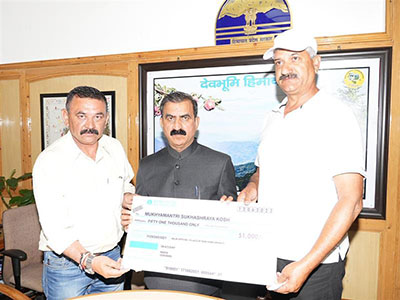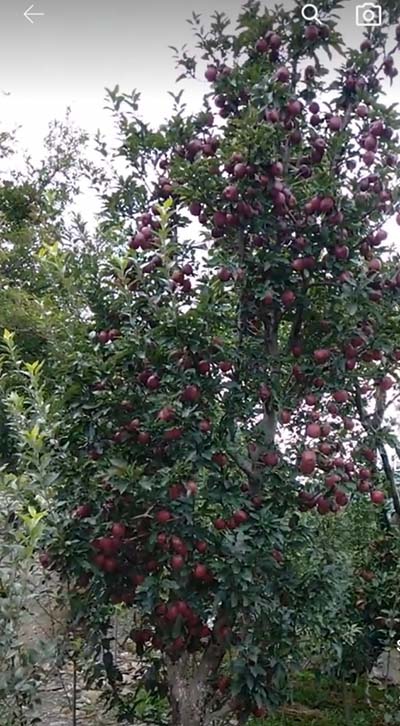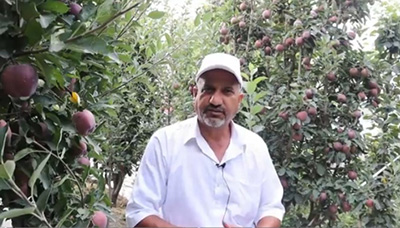SHIMLA- Prem Singh Chauhan, a progressive farmer from Kotkhai in Shimla district, is once again making headlines with his groundbreaking ideas.
After receiving the prestigious Himachal Prerana Srot Samman Puraskar, Chauhan made a noble gesture by presenting a cheque of Rs. 51,000 to the Chief Minister, Thakur Sukhvinder Singh Sukhu, for the Mukhya Mantri Sukh Aashray Kosh.
Chief Minister expressed his gratitude to Chauhan for his generous contribution and emphasized the significant impact such acts of kindness have on supporting vulnerable sections of society.
Chauhan had previously gained attention for his innovation in developing a new apple variety called APS, which he trademarked.
He successfully cultivated an ultra high-density single stemed apple orchard in his native Jhaltahr village in Kotkhai apple belt. His theory is one bigha=1000 apple plants that aims at using every inch of land available with the farmers.
With assistance from Dr. YS Parmar University of Horticulture and Forestry in Nauni, Solan, Chauhan has applied for a patent for the APS variety.
Chauhan also gives credit to apple messiah Satyanand Stokes for importing the apple varieties on seedlings which is best suited for the terrain in Himachal hills.
Stokes, a missionary from Indiana, the USA had imported the Red Delicious seedling apple varieties in 1915 and raised the first apple orchard at Badu Baag in Kotgarh, the first apple kingdom of Himachal.
Chauhan gives credit of his achievements to Dr. Vijay Singh Thakur, the former vice-chancellor of the university, for his invaluable assistance throughout the process. Chauhan's apples, known for their vibrant red color, have garnered him several prizes at apple festivals in Shimla.
Chauhan has been actively guiding farmers on cultivating high-density orchards using seedlings instead of the modern trend of relying on rootstocks on his YouTube Channel.
Chauhan has raised a multi cultural farming by planting cherries, plums, peaches in the peripheries and even on walls- a model for the apple farming in his orchard at Jaltahr.
But 'Shantu does not share his "trade secret about APS" and not give APS variety to the apple farmers for propagation, say his co-farmers.
However, many progressive farmers disagree with Chauhan's theory and advocate for self-pollinating apple varieties on those rootstocks which are suitable for the soil and hilly terrain of the Shimla apple belt, the largest apple producer in Himachal Pradesh.
This difference  of opinion has led to a division among apple farmers in the state regarding the rootstocks versus seedlings debate.
of opinion has led to a division among apple farmers in the state regarding the rootstocks versus seedlings debate.
Those in favor of rootstocks argue that there are root stocks that require less water and logistical support, making them suitable for the region's hilly conditions.
Conversely, those supporting seedlings argue that these varieties have adapted to the local environment, are resilient, and require less protection and water.
Proponents of rootstocks also highlight that apple plants grown on them start bearing fruits as early as the following year. They mention specific rootstocks such as Emla series, M106, 111, and Geneva series and others that exhibit sturdiness and require minimal water and support.
Overall, the disagreement between farmers regarding rootstocks and seedlings has sparked a lively debate within the apple farming community in Himachal Pradesh.
There are farmers who are live in their orchards on Social media, on YouTube Channels claiming superiority over others, creating more confusion than clarity over the apple cultivation.
While both approaches have their merits, it remains to be seen which method will prevail as the preferred choice for apple cultivation in the region. It appears both are coexisting depending upon individual orchardists.




